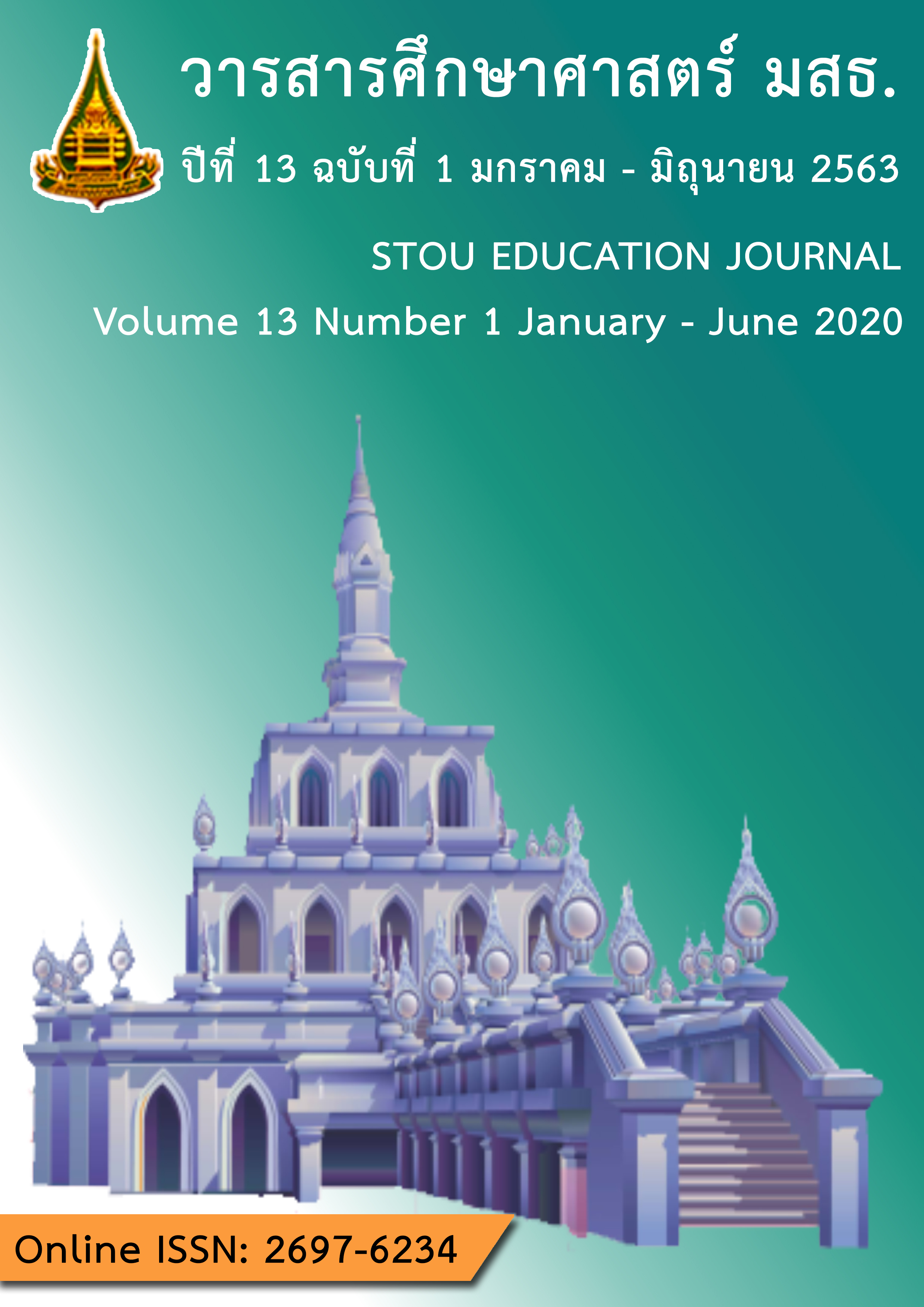ความสัมพันธ์ระหว่างการบริหารวิชาการตามแนวคิดชุมชนแห่งการเรียนรู้ทางวิชาชีพ ความไว้วางใจของคณะครู และคุณภาพของผลลัพธ์ทางการศึกษาในโรงเรียนมัธยมศึกษา สังกัดสำนักงานคณะกรรมการการศึกษาขั้นพื้นฐาน
Main Article Content
บทคัดย่อ
การวิจัยนี้มีวัตถุประสงค์เพื่อศึกษา 1) สภาพปัจจุบัน สภาพที่พึงประสงค์และความต้องการจำเป็นของการบริหารวิชาการโรงเรียนมัธยมศึกษา ตามแนวคิดชุมชนแห่งการเรียนรู้ทางวิชาชีพ แนวคิดความไว้วางใจของคณะครู และแนวคิดคุณภาพของผลลัพธ์ทางการศึกษา และ 2) ความสัมพันธ์ระหว่างการบริหารวิชาการตามแนวคิดชุมชนแห่งการเรียนรู้ทางวิชาชีพ การบริหารวิชาการตามแนวคิดความไว้วางใจของคณะครู และการบริหารวิชาการตามแนวคิดคุณภาพของผลลัพธ์ทางการศึกษา กลุ่มตัวอย่าง คือโรงเรียนมัธยมสังกัดสำนักงานคณะกรรมการศึกษาขั้นพื้นฐาน 333 โรง ผู้ให้ข้อมูลประกอบด้วย ผู้อำนวยการ รองผู้อำนวยการ ตัวแทนหัวหน้ากลุ่มสาระการเรียนรู้ และตัวแทนครู 1,020 คน สถิติที่ใช้ในการวิเคราะห์ข้อมูล ได้แก่ ร้อยละ ค่าเฉลี่ย ส่วนเบี่ยงเบนมาตรฐาน การวิเคราะห์ความต้องการจำเป็นด้วยดัชนี PNImodified และค่าสัมประสิทธิ์สหสัมพันธ์แบบเพียร์สัน ผลการวิจัยพบว่า 1) สภาพปัจจุบันของการบริหารวิชาการทั้งด้านหลักสูตร การจัดการเรียนการสอน และการวัดและประเมินผลของทั้งสามกลุ่มแนวคิดอยู่ในระดับมากทุกด้าน ส่วนสภาพที่พึงประสงค์ของทั้งสามกลุ่มแนวคิดอยู่ในระดับมากที่สุดทุกด้าน โดยความต้องการจำเป็นที่มีค่าสูงที่สุดเป็นอันดับแรก คือ การพัฒนาหลักสูตร อันดับสอง คือ การจัดการเรียนการสอน และอันดับสาม คือ การวัดและประเมินผล และ 2) ความสัมพันธ์ของตัวแปร พบลักษณะความสัมพันธ์ที่แตกต่างกัน โดยการบริหารวิชาการทุกด้านภายใต้แนวคิดเดียวกันมีความสัมพันธ์ในระดับปานกลางถึงสูงและเป็นไปในทิศทางเดียวกัน ส่วนการบริหารวิชาการที่ต่างแนวคิดกัน พบว่า มีเพียงการบริหารวิชาการตามแนวคิดความไว้วางใจของคณะครูกับการบริหารวิชาการตามแนวคิดคุณภาพของผลลัพธ์ทางการศึกษาที่มีความสัมพันธ์ทางบวกในระดับปานกลางถึงสูง ในขณะที่ด้านอื่นมีความสัมพันธ์กันในระดับต่ำมาก
Article Details
เอกสารอ้างอิง
เจนภพ ชัยวรรณ, ถนอมวรรณ ประเสริฐเจริญสุข, และภัทราวดี มากมี. (2559). โมเดลความสัมพันธ์เชิงสาเหตุของปัจจัยที่มีอิทธิพลต่อผลสัมฤทธิ์ทางการเรียนของนักเรียนในโรงเรียนรัฐบาลสังกัดสํานักงานเขตพื้นที่การศึกษาประถมศึกษา: การวิเคราะห์กลุ่มพหุ. วารสารบริหารการศึกษา มหาวิทยาลัยขอนแก่น, 12(2), 182-194.
ชาริณี ตรีวรัญญู. (2560). การสร้างชุมชนแห่งการเรียนรู้เชิงวิชาชีพด้วยการพัฒนาบทเรียนร่วมกัน: แนวคิดและแนวทางสู่ความสำเร็จ. วารสารครุศาสตร์, 45(1), 299-319.
ชไมพร ดิสถาพร. (2554). การพัฒนารูปแบบกิจกรรมการศึกษานอกระบบโรงเรียนโดยใช้สุนทรียสนทนาและการสื่อสารอย่างสันติเพื่อเสริมสร้างความสามารถด้านการสื่อสารภายในครอบครัวของผู้ปกครองเยาวชนผู้เข้ารับการบำบัดยาเสพติด. (วิทยานิพนธ์ปริญญาดุษฎีบัณฑิต ไม่ได้ตีพิมพ์). จุฬาลงกรณ์มหาวิทยาลัย, กรุงเทพมหานคร.
นภาพร แสงนิล. (2561). กลยุทธ์การเสริมสร้างคุณลักษณะความเป็นพลโลกให้กับผู้เรียนโรงเรียนมัธยมศึกษาจังหวัดน่าน. (วิทยานิพนธ์ปริญญาดุษฎีบัณฑิต ไม่ได้ตีพิมพ์). มหาวิทยาลัยราชภัฎเชียงใหม่, เชียงใหม่.
นิรมล ตู้จินดา. (2558). ภาพอนาคตหลักสูตรพลเมืองศึกษาระดับการศึกษาขั้นพื้นฐานในทศวรรษหน้า (ช่วงระหว่างปีพ.ศ. 2555-พ.ศ. 2565). วารสารสถาบันพระปกเกล้า, 13(2), 25-40.
บุญชม ศรีสะอาด. (2539). การแปลผลเมื่อใช้เครื่องมือรวบรวมข้อมูลแบบมาตราส่วนประมาณค่า. วารสารการวัดผลการศึกษา มหาวิทยาลัยมหาสารคาม, 2(1), 64-70.
วิภาดา พินลา. (2559). แนวทางการจัดการเรียนรู้สังคมศึกษาสู่ความเป็นพลเมืองไทย พลเมืองอาเซียน และพลโลกสำหรับผู้เรียนยุคศตวรรษที่ 21. วารสารศึกษาศาสตร์ มหาวิทยาลัยมหาสารคาม, 10(4), 7-18.
สัมฤทธิ์ ทองทับ และอุทัย ภิรมย์รื่น. (2557). การพัฒนาวัฒนธรรมโรงเรียนเพื่อส่งเสริมคุณภาพการศึกษาของโรงเรียนระดับประถมศึกษาในภาคตะวันออกเฉียงเหนือ. วารสารวิชาการมหาวิทยาลัยการจัดการและเทคโนโลยีอีสเทิร์น, 11(1), 77-90.
สิทธิศักดิ์ เทศประสิทธิ์ และจิติมา วรรณศรี. (2561). รูปแบบการบริหารเพื่อพัฒนาคุณลักษณะอันพึงประสงค์ของนักเรียนสู่ประชาคมอาเซียนในสถานศึกษาขั้นพื้นฐาน. วารสารศึกษาศาสตร์ มหาวิทยาลัยนเรศวร, 20(3), 224-237.
สุภชาดา เหมปาละธำรง. (2559). แนวทางการบริหารจัดการหลักสูตรสถานศึกษา ตามหลักสูตรแกนกลางการศึกษาขั้นพื้นฐาน พุทธศักราช 2551 ของโรงเรียนต้นแบบสำนักงานเขตพื้นที่การศึกษานครสวรรค์ เขต 1-3. วารสารวิชาการ มหาวิทยาลัยอีสเทิร์นเอเชีย ฉบับสังคมศาสตร์และมนุษยศาสตร์, 6(1), 337-348.
สุริศา ริมคีรี. (2561). แนวทางการขับเคลื่อน PLC สู่การพัฒนาคุณภาพผู้เรียน Thailand 4.0 สพม.17. สืบค้นจาก http://www.sesa17.go.th/site/images/PLC-Sesa17-guide-2560.pdf.
สุวิมล ว่องวาณิช. (2550). การวิจัยประเมินความต้องการจำเป็น. กรุงเทพมหานคร: สำนักพิมพ์แห่งจุฬาลงกรณ์มหาวิทยาลัย.
สำนักงานเลขาธิการสภาการศึกษา. (2560). แผนการศึกษาแห่งชาติ พ.ศ. 2560 –2579. กรุงเทพมหานคร: พริกหวานกราฟฟิค.
Bryk, A., & Schneider, B. (2002). Trust in schools: A core resource for improvement. Russell Sage Foundation.
DuFour, R., & DuFour, R. (2008). Revisiting professional learning communities at WorkTM: New insights for improving schools. IN: Solution Tree Press.
Gruenert, S. (2005). Correlations of collaborative school cultures with student achievement. Nassp Bulletin, 89(645), 43-55.
Hinkle, D. E., Wiersma, W., & Jurs, S. G. (1998). Applied statistics for the behavioral sciences (4th ed.). Boston: Houghton Mifflin.
Hipp, K. K., & Huffman, J. B. (2003, January 5-8). Professional Learning Communities: Assessment--Development--Effects. Paper presented at Sydney, Australia.
Hord, S. M. (1997). Professional learning communities: Communities of continuous inquiry and improvement. Austin, TX: Southwest Educational Development Laboratory.
Hoy, W. K., & Tschannen-Moran, M. (1999). Five faces of trust: An empirical confirmation in urban elementary schools. Journal of School leadership, 9(3), 184-208.
Louis, K. S. (2006). Changing the culture of schools: Professional community, organizational learning, and trust. Journal of School leadership, 16(5), 477-489.
McKnight, D. H., & Chervany, N. L. (2001). Trust and distrust definitions: One bite at a time. In Falcone R., Singh M., Tan YH. (eds). Trust in Cyber-societies, 27-54. Berlin, Heidelberg: Springer.
Reichstetter, R. (2006). Defining a professional learning community. (Report No.06.05). NC: E&R Research Alert.
Rieckmann, M. (2017). Education for sustainable development goals: Learning objectives. Paris: UNESCO Publishing.
Stoll, L., Bolam, R., McMahon, A., Wallace, M., & Thomas, S. (2006). Professional learning communities: A review of the literature. Journal of educational change, 7(4), 221-258.
Tschannen-Moran, M. (2014). Trust matters: Leadership for successful schools. CA: John Wiley & Sons.
Tschannen-Moran, M., & Gareis, C. R. (2015). Faculty trust in the principal: An essential ingredient in high-performing schools. Journal of educational administration, 53(1), 66-92.
Yamane, T. (1973). Statistics: An introduction analysis. NY: Harper & Row.


